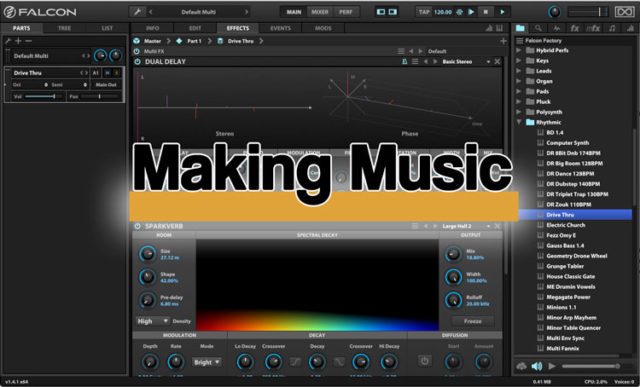Last Updated on February 4, 2018 by Andrew Culture
UVI Falcon – why?
I’ll be honest with you. I’ve sat on this review for a long time. When we review software packages at Making Music there are several key aspects that we like to cover. For example, we know that our readers want to know about how software works from a mechanical / workflow perspective.
Expressing how software actually sounds is one of the most challenging aspects of any review. It’s especially challenging trying to review sounds from an objective perspective. A sound that might be considered unlistenable to one user could be the foundation of an entire set for another. So for this review I’m going to do things a little differently.
Take it as read that none of the sounds in Falcon want for anything. Every sound that has come out of Falcon in the time I’ve been getting to know it has had me grinning ear to ear.
Instead of detailing the mechanics of Falcon by UVI I’m going to focus on a different aspect. I’m going to tell you how this software feels to use. To start painting this picture I need to explain the canvas. I am the canvas. I make no secret of the fact that when I became the editor of Making-Music.com I was very much at the start of my computer music journey. I have spent around 25 years slinging a bass guitar about the stage, playing in loud, loose rawkus bands. The other reviewers here at Making-Music.com are extremely experienced. For example; Ian Waugh has been writing about computer music for a very long time. Gareth Patch has spent years teaching music theory, performance, live and studio sound reinforcement at a very high level for years.
Over the past year or so I’ve learned a lot about making music on computers, but not so much that I’m not daunted by some software. When I first opened Falcon it looked like I was going to struggle to get to grips with it. But a couple of short YouTube tutorials later I had my virtual sleeves rolled up and was cheerfully up to my armpits under the hood of Falcon.
The Falcon interface works in a similar way to Kontakt. Each instrument, synth, or preset that you open is placed on the virtual desktop. More than one instrument can be open at once. From this point there are an incredible number of options that can be adjusted on each instrument.
Most of the presets come with plenty of options for making the sounds your own. There are the controls that you might expect to see in any soft instrument; pitch, gain, pan etc. But there are also an incredible number of controls that are not standard.
As I dug deeper into the controls I started to realise why Falcon is so popular as a sound design tool. While packages like Arturia Analog Lab offer a myriad of instruments, each with an impressive amount of controls. Falcon lets you really get your apron filthy when mixing audio ingredients.
As I mentioned earlier, I am not a seasoned professional when it comes to sound design, but within minutes of using Falcon I was creating some wild sounds. I’ve never used a software package that allowed me to get lost in a creative frenzy so easily. Skrillex style grunts, grinds and sweeps? No problem. DeadMau5 type chordal thumps? Easy. Dreamy Orbital style pads? Go nuts! Okay, so I’m talking extremes. But if you have a sound stuck in your head that you want to get into your DAW then Falcon won’t disappoint. If you have no idea what sound you’re looking for then spending a few minutes with Falcon will likely reveal a clear path to you, change the direction of the track you’re working on, or probably spawn an entirely new track. The potential here is vast.
UVI Falcon sampler
In addition to the incredible number of instruments and potential for deep sound design Falcon also comes equipped with a sampler. In a recent interview with drum and bass legend InsideInfo was asked how he generates such original sounds. The answer was that he records his own sounds foley style, then drops them into UVI Falcon for manipulation. This concept of being able to use the sampler in Falcon to create totally original sounds is incredibly appealing. Not just because it means there’s no sample clearance needed when you are ready to release your work into the wild.
UVI Falcon – Conclusion
Someone once told me that no individual knows all the functions of Microsoft Excel. It’s just too big. I think the same could possibly be said of Falcon. If you’re looking for your first software package, or have a limited budget (so, like all of us) and you want to buy one tool that will cover the widest range of your needs, then you should consider Falcon by UVI. If you have been making music with computers for decades then Falcon is a tool you can push to the limit of your experience and knowledge.
Falcon is the sort of tool that could cover all sonic bases for an entire album of work without becoming repetitive. Falcon inspires the kind of exciting creativity that I’ve only previously experienced from hardware synths. In fact, as soon as I have finished writing this review I’m going to start work on a new album. That’s how I feel about UVI Falcon.
Find out more about UVI Falcon…

















